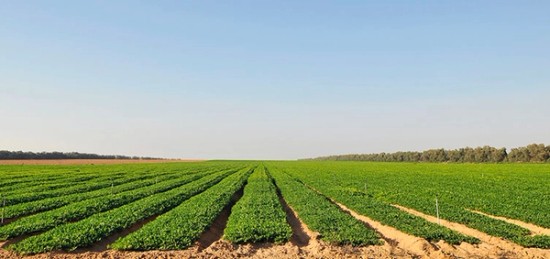With a population that will reach nine billion by 2050, there is a real need for sustainably sourced foods. Water-efficient, nutrient and energy-dense crops, such as peanuts, are key to meeting the food supply and nutrition demands of the future.
America’s favorite nut is one of the most sustainable, nutritious food sources available to meet the challenges of a growing world.
Water Usage
Peanuts are the most water-efficient nut. It takes 3.2 gallons of water to produce one ounce of peanuts when it takes roughly 28.7 gallons of water to grow one ounce of almonds. Peanut plants use less water to grow due to their compact plant structure and underground fruiting. Their roots also replenish the essential nitrogen in the soil that is depleted by other crops. This means that farmers will use less fertilizer to grow peanuts and the next season’s crop, such as cotton.

Nutrients and Health Benefits
Peanuts have more protein than any nut (7g per serving), contain more than 30 essential vitamins and minerals and are a good source of fiber and good fats. In fact, research studies from Harvard and the American Journal of Clinical Nutrition confirm that peanuts have a positive impact on disease prevention and health maintenance. Additionally, plant-based diets promote better health and cause less environmental impact than diets rich in animal-based foods.(1)
Contribution to a Green Planet
When it comes to the peanut itself, no part goes unused. Pelletized peanuts made from the peanut hulls are used for animal feed and fuel. Peanut “hay” made from the vines, is used as food for cattle and ground cover or put back in the land to enrich the soil. In addition, scientists are researching peanut skins, which contain high levels of antioxidants and polyphenols, for emergent uses. There is also technology available to create useful substances out of peanut oil in the future. All of these efforts position the peanut to meet the growing consumer movement to help the planet by eating more plant-based foods.
Through continuous improvements in water conservation, chemical reduction and farmland development, in addition to having positive impacts on health and nutrition, peanuts are the food of the future. Learn more about peanuts and sustainability here.
----
